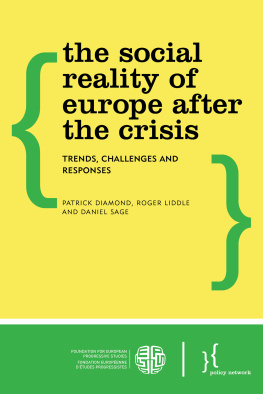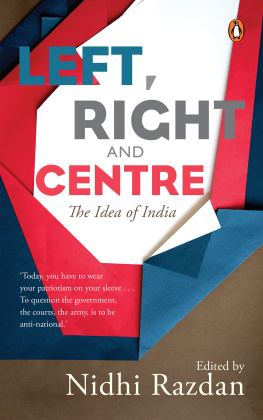ENDGAME FOR THE CENTRE LEFT?
About Policy Network
Policy Network is an international thinktank and research institute. Its network spans national borders across Europe and the wider world with the aim of promoting the best progressive thinking on the major social and economic challenges of the 21st century.
Our work is driven by a network of politicians, policymakers, business leaders, public service professionals, and academic researchers who work on long-term issues relating to public policy, political economy, social attitudes, governance and international affairs. This is complemented by the expertise and research excellence of Policy Networks international team.
A platform for research and ideas
Promoting expert ideas and political analysis on the key economic, social and political challenges of our age.
Disseminating research excellence and relevant knowledge to a wider public audience through interactive policy networks, including interdisciplinary and scholarly collaboration.
Engaging and informing the public debate about the future of European and global progressive politics.
A network of leaders, policymakers and thinkers
Building international policy communities comprising individuals and affiliate institutions.
Providing meeting platforms where the politically active, and potential leaders of the future, can engage with each other across national borders and with the best thinkers who are sympathetic to their broad aims.
Engaging in external collaboration with partners including higher education institutions, the private sector, thinktanks, charities, community organisations, and trade unions.
Delivering an innovative events programme combining in-house seminars with large-scale public conferences designed to influence and contribute to key public debates.
www.policy-network.net
ENDGAME FOR THE CENTRE LEFT?
The Retreat of Social Democracy Across Europe
London New York
Published by Rowman & Littlefield International Ltd.
Unit A, Whitacre, 26-34 Stannary Street, London, SE11 4AB
www.rowmaninternational.com
Rowman & Littlefield International Ltd. is an affiliate of Rowman & Littlefield
4501 Forbes Boulevard, Suite 200, Lanham, Maryland 20706, USA
With additional offices in Boulder, New York, Toronto (Canada), and Plymouth (UK)
www.rowman.com
Copyright 2016 Policy Network
All rights reserved . No part of this book may be reproduced in any form or by any electronic or mechanical means, including information storage and retrieval systems, without written permission from the publisher, except by a reviewer who may quote passages in a review.
British Library Cataloguing in Publication Data
A catalogue record for this book is available from the British Library
ISBN: PB 978-1-78660-282-4
ISBN: eBook 978-1-78660-283-1
Library of Congress Cataloging-in-Publication Data
Library of Congress Control Number: 2016954179

The paper used in this publication meets the minimum requirements of American National Standard for Information SciencesPermanence of Paper for Printed Library Materials, ANSI/NISO Z39.48-1992.
Printed in the United States of America
Contents
Patrick Diamond is co-chair and research director at Policy Network. He is a lecturer in Public Policy at Queen Mary, University of London, Gwilym Gibbon fellow at Nuffield College, Oxford, and a visiting fellow in the Department of Politics at the University of Oxford. Until May 2010 he was head of policy planning in 10 Downing Street and senior policy adviser to the prime minister.
T his short book is a contribution to the growing debate on the left in Europe about the future of social democracy, and the likely prospects for left of centre politics. After a period of electoral dominance, centre-left parties in western Europe have suffered a dramatic erosion of support; the vote share enjoyed by social democrats is at its lowest ever level. Already, much has been written about why social democracy is in a state of decline; political diagnosis is essential to understand what strategies might now be available to centre-left parties. This books argument is that social democracy stands at a point of great promise, but also peril. To write off centre left politics now would be a great mistake: right and centre-right competitor parties have their own problems; in any case, societies have not rejected social democratic values. The ideal of solidarity and the imperative of forging bonds of connection in a volatile, interdependent world is as compelling as it always was.
At the same time, the centre left clearly faces difficulties: the forward march of labour has been abruptly halted while declining trust in politics adds to the problem of constructing viable electoral coalitions. The UKs decision to vote to leave the European Union on June 23 raises the prospect of societies throughout Europe irreparably divided between voters who embrace economic openness, and those who are opposed to change. Social democracy has to find new ways to build bridges between open and closed communities by updating public institutions and policies, just as socialist parties did in the immediate aftermath of the second world war. This is an urgent task. There is not a moment to lose.
O ver the past decade, social democratic parties across western Europe have been in ignominious retreat. The centre lefts electoral decline has been unprecedented. Even where social democrats have attained governmental power, often in coalition with other parties, their experience has been unhappy, followed rapidly by defeat. As a result, many commentators insist that social democracy has lost its vitality, and is destined to wane as a political force and an ideological tradition in Europe. This book considers the factors behind social democracys decline over the past decade, giving particular attention to the rise of populist counter-movements across the European Union. It then looks ahead at the future of centre-left politics in Europe with an eye towards potential strategies for stemming the lefts demise.
The central argument is that for all the difficulties facing social democracy, pessimism can be overstated: despite the apparent demise of centre-left politics, a new progressive era is within reach underpinned by renewed government activism and a new collectivism that goes beyond the traditional state; the new politics of left reform has the potential to fashion a more egalitarian capitalism and a fairer, more inclusive society. This age of progressive reform will be rooted in new electoral coalitions, new governing strategies, and new political narratives.
It is always tempting to search for social trends that might presage a dramatic shift in the centre of gravity towards the left. However, structural change does not have any pre-determined effect on the fortunes of parties: in the early 20th century, the growth of the working class was supposed to ensure the rise of socialism eclipsing Europes Conservative and Christian democratic parties. In the aftermath of the second world war, it was feared that the structural decline of the working class and the growth of affluence and mass prosperity would destroy social democracy. But electoral majorities are there to be forged from the raw material of social change; this depends on the skill with which parties develop new ideas and create a language that can appeal to the board majority. The 2008 crisis was heralded as a social democratic moment in the industrialised countries, but the opportunity was squandered as too many centre-left politicians believed that a crisis of the capitalist system would lead inevitably to a rise in support for the left. They failed to cultivate a new generation of progressive ideas and policy programmes akin to the advance of Keynesianism in the 1930s. It is to this vital task that social democrats must now turn.


 The paper used in this publication meets the minimum requirements of American National Standard for Information SciencesPermanence of Paper for Printed Library Materials, ANSI/NISO Z39.48-1992.
The paper used in this publication meets the minimum requirements of American National Standard for Information SciencesPermanence of Paper for Printed Library Materials, ANSI/NISO Z39.48-1992.











